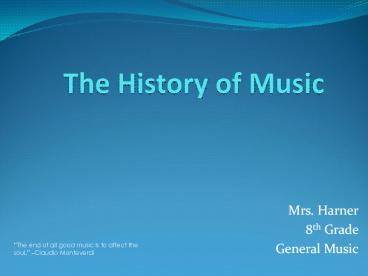The%20History%20of%20Music - PowerPoint PPT Presentation
Title:
The%20History%20of%20Music
Description:
Mrs. Harner 8th Grade General Music The end of all good music is to affect the soul. Claudio Monteverdi Music History A. Timeline of Music History *Antiquity ... – PowerPoint PPT presentation
Number of Views:282
Avg rating:3.0/5.0
Title: The%20History%20of%20Music
1
The History of Music
- Mrs. Harner
- 8th Grade
- General Music
The end of all good music is to affect the
soul. Claudio Monteverdi
2
Music History
A. Timeline of Music History
Antiquity --- Pre-400 AD
- Middle Ages --- 400 AD - 1400 AD
- Gregorian chant (named for Pope Gregory)
- Renaissance --- 1400 AD - 1600 AD
- Leonardo da Vinci, Shakespeare, Galileo, Medici
Family, Martin Luther (Reformation)
- Baroque --- 1600 AD - 1750 AD
- Bach, Handel, Vivaldi, Ornamentation
- Classical --- 1750 AD - 1825 AD
- Mozart, Beethoven, Haydn
- Romantic --- 1825 AD - 1900 AD
- Schubert, Saint-Saens, Chopin, Brahms
- 20th Century --- 1900 AD - 1991 AD
- Gershwin, Copland, Stravinsky
3
Music History
The Middle Ages
400-1400 A.D.
(or the Medieval Period)
A.D. means Anno Domini in the year of Our Lord
4
Music History
The Middle Ages/Medieval Period
- The Medieval period represents almost a thousand
years - of the music history of Europe.
- This period is also called the Middle Ages and
the Dark Ages.
- Many people died of disease during this
period. (Black Death) - It was a dark time in history because of
sickness, and death. - Much of the music of this time has been lost.
- Most of the composers of this time are
anonymous. - This means we don't know who they are. They
didn't want to - be thought of as bragging, so they didn't
sign their work.
- The Catholic Church had the strongest influence
over all music
5
Music History
The Middle Ages/Medieval Period
Write this down!
- 2 kinds of music
SACRED religious music or music of the Church
SECULAR entertainment music everyday life
- Notation During the Medieval period most music
was not written down. - Composers who did write their music down usually
worked for - the Catholic Church.
- The Church could afford to buy the materials the
composers - would need to write music.
- People outside the Church were too poor to buy
what was - needed to compose music.
6
Music History
C. Middle Ages ----- 400 - 1400 AD
Take these notes!
1. Most important type of music
a. Gregorian Chant
-named after Pope Gregory the Great
-also known as plainchant, plainsong, and chant
-definition one melody sung in unison only
sung by males during this time period, no
accompanying instruments (just voices), sacred
(religious)
- Neumes were used to notate music before
- the modern-day Five-line staff
7
Music History
Take these notes!
C. Middle Ages ----- 400 - 1400 AD
2. Three divisions of people during the Middle
Ages
a. nobility
-rich and elite
-kings, queens, princes, etc. made up this class
b. clergy
-religious scholars
-worked for the Catholic Church
c. peasants
-extremely poor, lower class citizens
-worked for the nobility
-lived to be about 30 years old
8
Music History
C. Middle Ages ----- 400 - 1400 AD
2. Three divisions of people during the Middle
Ages
- The clergy and nobility made up only 5 of the
- population, while the peasants made up about 95.
-The peasants could not get an education,
therefore they did not know very much about
music. This is why there was not very much music
created during the Middle Ages.
9
Music History
Take this note!
C. Middle Ages ----- 400 - 1400 AD
3. Sacred Music
a. Gregorian Chant (monophonic or only one
melody)
10
Music History
C. Middle Ages ----- 400 - 1400 AD
Take these notes!
3. Sacred Music
b. Leonin and Perotin
-two Catholic priests who were also composers
-they put two different Gregorian chants
together and singing them at the same time
-this was the beginning of polyphonic music (two
or more different melodies)
11
Music History
Take these notes!
C. Middle Ages ----- 400 - 1400 AD
4. Secular Music
- Simple songs about love, nature, mythology,
- heroic battles, etc.
- sung by traveling musicians who were called
- troubadours.
-troubadours sang and played guitar-like
instruments called lutes.
12
Music History
C. Middle Ages ----- 400 - 1400 AD
5. The end of the Middle Ages
- The fall of a large city called Constantinople
signaled - the end of the Middle Ages and the beginning of
the - Renaissance.
-The Renaissance began at this time because all
of the musicians, artists, scholars, and
scientists in the city moved to other countries
when the city was conquered.































